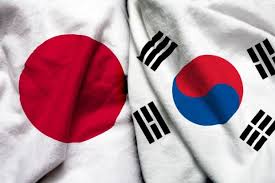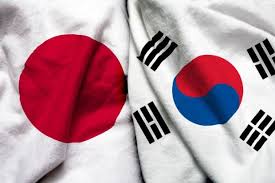
Japan has decided to carry on with its announcement of removing South Korea from its list of trusted trade partners which threatened to escalate the trade related spat between the two countries that has been brewing since the last few weeks.
This decision of Japan to strike South Korea o ff the list adds on to the earlier export curbs imposed on the country.
While condemning the "selfish" act Tokyo, South Korean President Moon Jae-in has said that possible retaliatory action can be taken by Seoul.
Japan has earlier imposed a curb on export three materials to South Korea which are crucial in the manufacturing of memory chips and displays which threatened to hit the global electronics sector. The most recent trade tensions between Tokyo and Seoul was sparked by diplomatic tensions over compensation for forced labor of South Korean people by Japanese companies during World War II.
While claiming that the measures have been taken because of security concerns, Japan has said criticized inadequate export controls of South Korea.
Tokyo's "selfish act will inflict tremendous damage on the world economy by disrupting global supply chains", Said Moon during a televised cabinet meeting. "Responsibility for what is going to happen next also lies squarely with the Japanese government. Though Japan is an economic powerhouse, if it were to damage our economy, we likewise have countermeasures to implement in kind," the president said.
The moves by Japan were described as "all out declaration of economic war" by South Korea's ruling Democratic Party.
South Korea would be removed of Japan’s list of preferred trading countries later this month. Following the delisting, special clearance for exporting a range of goods to South Korea has to be taken by Japanese exporters. There are currently has 27 countries in Japan’s list which includes Germany, the UK and the US and South Korea is the first country to be removed from hat list.
The earlier export curb on three materials to South Korea was taken about a month ago which is believed to have put a number of South Korean tech companies including the likes of Samsung in trouble. The Japanese restrictions are on materials that are critical in the manufacturing of display panels and memory chips. There are worries that this move will cause an issue with the global supply chain of memory chips and display as well as on output and supply.
According to experts and market analysts, the trade row between Japan and South Korea can also result in an increase in price increase for smartphone, laptop and televisions. More than half of the world's semiconductors and display screens for these devices is supplied by South Korean tech firms.
Global supply could be affected by the decision of Japan to remove Seoul of its fast-track trade status list. The dispute has also resulted in Japanese goods being boycotted by millions of South Koreans while also holding a number of have across the country.
(Source:www.bbc.com)
This decision of Japan to strike South Korea o ff the list adds on to the earlier export curbs imposed on the country.
While condemning the "selfish" act Tokyo, South Korean President Moon Jae-in has said that possible retaliatory action can be taken by Seoul.
Japan has earlier imposed a curb on export three materials to South Korea which are crucial in the manufacturing of memory chips and displays which threatened to hit the global electronics sector. The most recent trade tensions between Tokyo and Seoul was sparked by diplomatic tensions over compensation for forced labor of South Korean people by Japanese companies during World War II.
While claiming that the measures have been taken because of security concerns, Japan has said criticized inadequate export controls of South Korea.
Tokyo's "selfish act will inflict tremendous damage on the world economy by disrupting global supply chains", Said Moon during a televised cabinet meeting. "Responsibility for what is going to happen next also lies squarely with the Japanese government. Though Japan is an economic powerhouse, if it were to damage our economy, we likewise have countermeasures to implement in kind," the president said.
The moves by Japan were described as "all out declaration of economic war" by South Korea's ruling Democratic Party.
South Korea would be removed of Japan’s list of preferred trading countries later this month. Following the delisting, special clearance for exporting a range of goods to South Korea has to be taken by Japanese exporters. There are currently has 27 countries in Japan’s list which includes Germany, the UK and the US and South Korea is the first country to be removed from hat list.
The earlier export curb on three materials to South Korea was taken about a month ago which is believed to have put a number of South Korean tech companies including the likes of Samsung in trouble. The Japanese restrictions are on materials that are critical in the manufacturing of display panels and memory chips. There are worries that this move will cause an issue with the global supply chain of memory chips and display as well as on output and supply.
According to experts and market analysts, the trade row between Japan and South Korea can also result in an increase in price increase for smartphone, laptop and televisions. More than half of the world's semiconductors and display screens for these devices is supplied by South Korean tech firms.
Global supply could be affected by the decision of Japan to remove Seoul of its fast-track trade status list. The dispute has also resulted in Japanese goods being boycotted by millions of South Koreans while also holding a number of have across the country.
(Source:www.bbc.com)














